
agent-toolkit
Python and TypeScript library for integrating the Stripe API into agentic workflows
Stars: 605
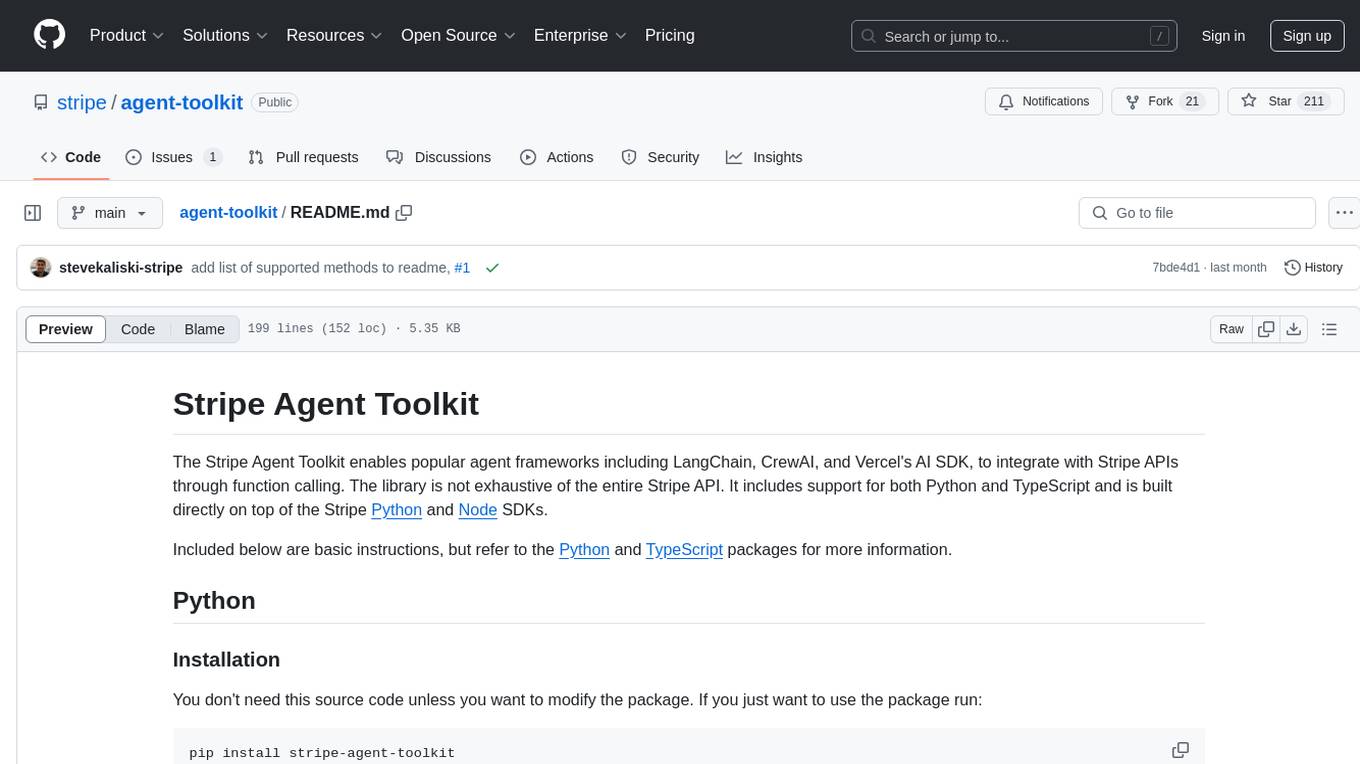
The Stripe Agent Toolkit enables popular agent frameworks to integrate with Stripe APIs through function calling. It includes support for Python and TypeScript, built on top of Stripe Python and Node SDKs. The toolkit provides tools for LangChain, CrewAI, and Vercel's AI SDK, allowing users to configure actions like creating payment links, invoices, refunds, and more. Users can pass the toolkit as a list of tools to agents for integration with Stripe. Context values can be provided for making requests, such as specifying connected accounts for API calls. The toolkit also supports metered billing for Vercel's AI SDK, enabling billing events submission based on customer ID and input/output meters.
README:
The Stripe Agent Toolkit enables popular agent frameworks including OpenAI's Agent SDK, LangChain, CrewAI, Vercel's AI SDK, and Model Context Protocol (MCP) to integrate with Stripe APIs through function calling. The library is not exhaustive of the entire Stripe API. It includes support for both Python and TypeScript and is built directly on top of the Stripe Python and Node SDKs.
Included below are basic instructions, but refer to the Python and TypeScript packages for more information.
You don't need this source code unless you want to modify the package. If you just want to use the package run:
pip install stripe-agent-toolkit- Python 3.11+
The library needs to be configured with your account's secret key which is available in your Stripe Dashboard.
from stripe_agent_toolkit.openai.toolkit import StripeAgentToolkit
stripe_agent_toolkit = StripeAgentToolkit(
secret_key="sk_test_...",
configuration={
"actions": {
"payment_links": {
"create": True,
},
}
},
)The toolkit works with OpenAI's Agent SDK, LangChain, and CrewAI and can be passed as a list of tools. For example:
from agents import Agent
stripe_agent = Agent(
name="Stripe Agent",
instructions="You are an expert at integrating with Stripe",
tools=stripe_agent_toolkit.get_tools()
)Examples for OpenAI's Agent SDK,LangChain, and CrewAI are included in /examples.
In some cases you will want to provide values that serve as defaults when making requests. Currently, the account context value enables you to make API calls for your connected accounts.
stripe_agent_toolkit = StripeAgentToolkit(
secret_key="sk_test_...",
configuration={
"context": {
"account": "acct_123"
}
}
)You don't need this source code unless you want to modify the package. If you just want to use the package run:
npm install @stripe/agent-toolkit
- Node 18+
The library needs to be configured with your account's secret key which is available in your Stripe Dashboard. Additionally, configuration enables you to specify the types of actions that can be taken using the toolkit.
import { StripeAgentToolkit } from "@stripe/agent-toolkit/langchain";
const stripeAgentToolkit = new StripeAgentToolkit({
secretKey: process.env.STRIPE_SECRET_KEY!,
configuration: {
actions: {
paymentLinks: {
create: true,
},
},
},
});The toolkit works with LangChain and Vercel's AI SDK and can be passed as a list of tools. For example:
import { AgentExecutor, createStructuredChatAgent } from "langchain/agents";
const tools = stripeAgentToolkit.getTools();
const agent = await createStructuredChatAgent({
llm,
tools,
prompt,
});
const agentExecutor = new AgentExecutor({
agent,
tools,
});In some cases you will want to provide values that serve as defaults when making requests. Currently, the account context value enables you to make API calls for your connected accounts.
const stripeAgentToolkit = new StripeAgentToolkit({
secretKey: process.env.STRIPE_SECRET_KEY!,
configuration: {
context: {
account: "acct_123",
},
},
});For Vercel's AI SDK, you can use middleware to submit billing events for usage. All that is required is the customer ID and the input/output meters to bill.
import { StripeAgentToolkit } from "@stripe/agent-toolkit/ai-sdk";
import { openai } from "@ai-sdk/openai";
import {
generateText,
experimental_wrapLanguageModel as wrapLanguageModel,
} from "ai";
const stripeAgentToolkit = new StripeAgentToolkit({
secretKey: process.env.STRIPE_SECRET_KEY!,
configuration: {
actions: {
paymentLinks: {
create: true,
},
},
},
});
const model = wrapLanguageModel({
model: openai("gpt-4o"),
middleware: stripeAgentToolkit.middleware({
billing: {
customer: "cus_123",
meters: {
input: "input_tokens",
output: "output_tokens",
},
},
}),
});The Stripe Agent Toolkit also supports the Model Context Protocol (MCP).
To run the Stripe MCP server using npx, use the following command:
npx -y @stripe/mcp --tools=all --api-key=YOUR_STRIPE_SECRET_KEYReplace YOUR_STRIPE_SECRET_KEY with your actual Stripe secret key. Or, you could set the STRIPE_SECRET_KEY in your environment variables.
Alternatively, you can set up your own MCP server. For example:
import { StripeAgentToolkit } from "@stripe/agent-toolkit/modelcontextprotocol";
import { StdioServerTransport } from "@modelcontextprotocol/sdk/server/stdio.js";
const server = new StripeAgentToolkit({
secretKey: process.env.STRIPE_SECRET_KEY!,
configuration: {
actions: {
paymentLinks: {
create: true,
},
products: {
create: true,
},
prices: {
create: true,
},
},
},
});
async function main() {
const transport = new StdioServerTransport();
await server.connect(transport);
console.error("Stripe MCP Server running on stdio");
}
main().catch((error) => {
console.error("Fatal error in main():", error);
process.exit(1);
});For Tasks:
Click tags to check more tools for each tasksFor Jobs:
Alternative AI tools for agent-toolkit
Similar Open Source Tools

agent-toolkit
The Stripe Agent Toolkit enables popular agent frameworks to integrate with Stripe APIs through function calling. It includes support for Python and TypeScript, built on top of Stripe Python and Node SDKs. The toolkit provides tools for LangChain, CrewAI, and Vercel's AI SDK, allowing users to configure actions like creating payment links, invoices, refunds, and more. Users can pass the toolkit as a list of tools to agents for integration with Stripe. Context values can be provided for making requests, such as specifying connected accounts for API calls. The toolkit also supports metered billing for Vercel's AI SDK, enabling billing events submission based on customer ID and input/output meters.
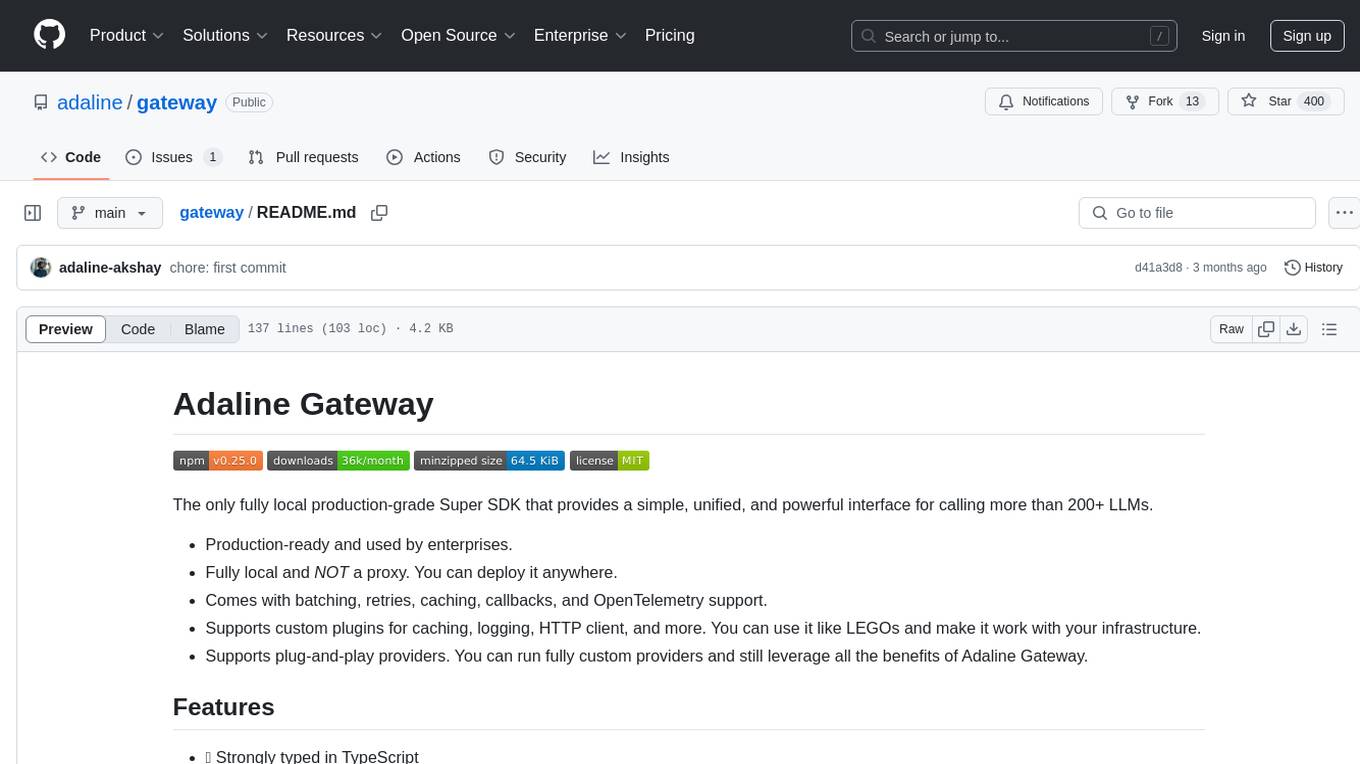
gateway
Adaline Gateway is a fully local production-grade Super SDK that offers a unified interface for calling over 200+ LLMs. It is production-ready, supports batching, retries, caching, callbacks, and OpenTelemetry. Users can create custom plugins and providers for seamless integration with their infrastructure.
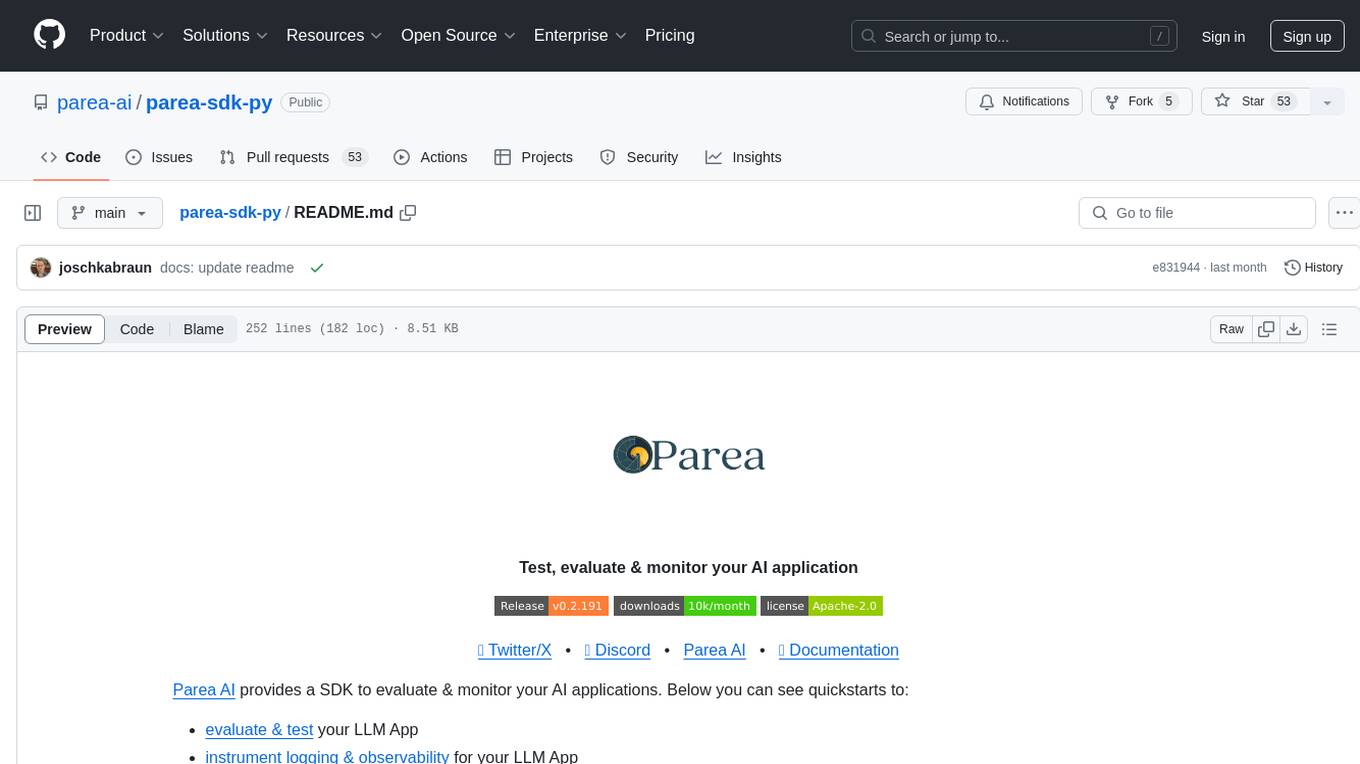
parea-sdk-py
Parea AI provides a SDK to evaluate & monitor AI applications. It allows users to test, evaluate, and monitor their AI models by defining and running experiments. The SDK also enables logging and observability for AI applications, as well as deploying prompts to facilitate collaboration between engineers and subject-matter experts. Users can automatically log calls to OpenAI and Anthropic, create hierarchical traces of their applications, and deploy prompts for integration into their applications.
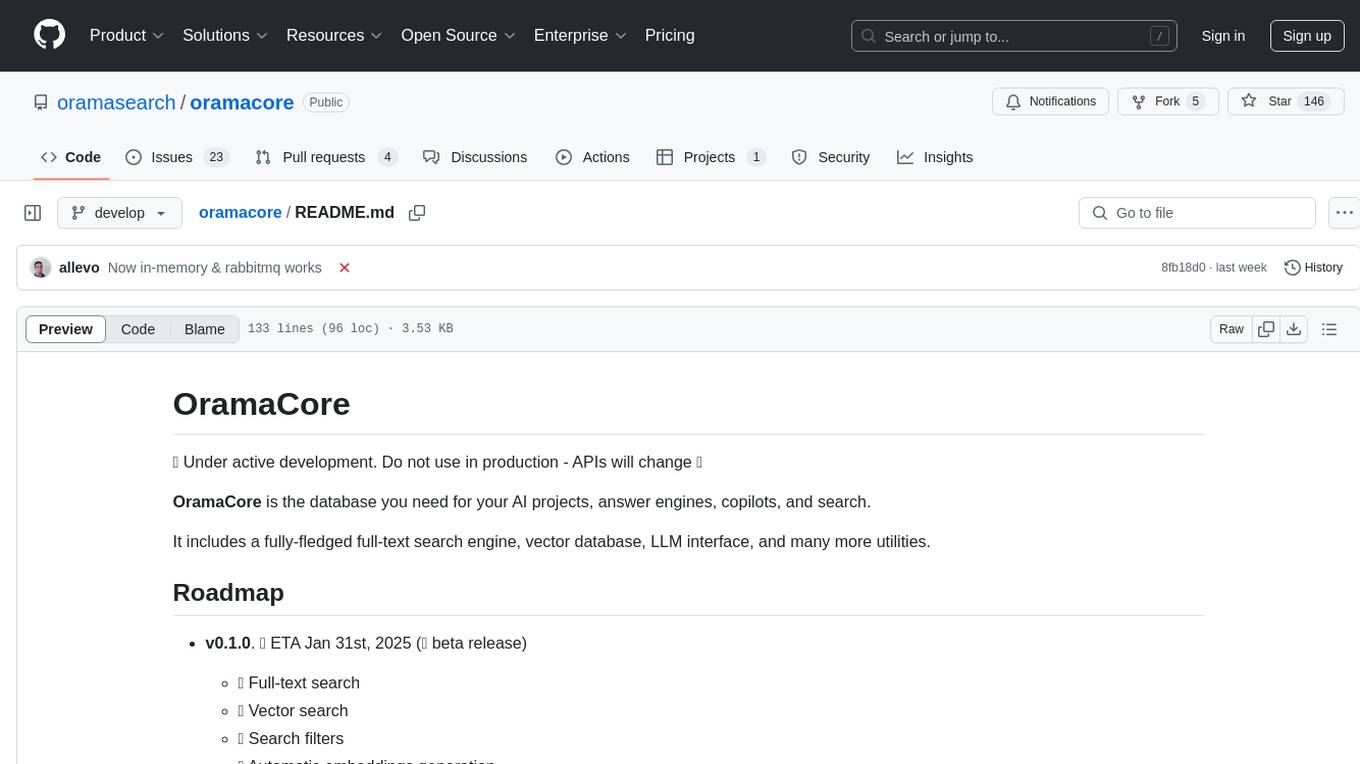
oramacore
OramaCore is a database designed for AI projects, answer engines, copilots, and search functionalities. It offers features such as a full-text search engine, vector database, LLM interface, and various utilities. The tool is currently under active development and not recommended for production use due to potential API changes. OramaCore aims to provide a comprehensive solution for managing data and enabling advanced search capabilities in AI applications.
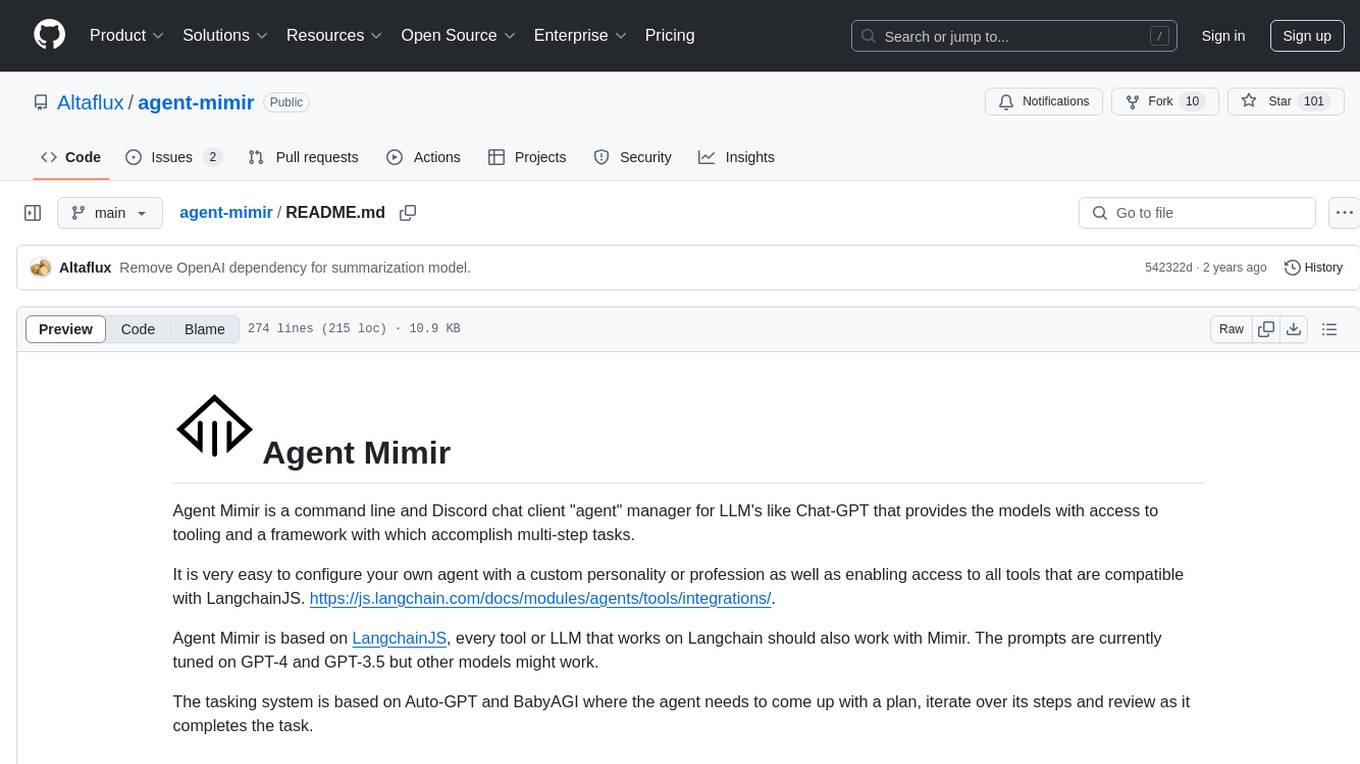
agent-mimir
Agent Mimir is a command line and Discord chat client 'agent' manager for LLM's like Chat-GPT that provides the models with access to tooling and a framework with which accomplish multi-step tasks. It is easy to configure your own agent with a custom personality or profession as well as enabling access to all tools that are compatible with LangchainJS. Agent Mimir is based on LangchainJS, every tool or LLM that works on Langchain should also work with Mimir. The tasking system is based on Auto-GPT and BabyAGI where the agent needs to come up with a plan, iterate over its steps and review as it completes the task.

generative-ai
The 'Generative AI' repository provides a C# library for interacting with Google's Generative AI models, specifically the Gemini models. It allows users to access and integrate the Gemini API into .NET applications, supporting functionalities such as listing available models, generating content, creating tuned models, working with large files, starting chat sessions, and more. The repository also includes helper classes and enums for Gemini API aspects. Authentication methods include API key, OAuth, and various authentication modes for Google AI and Vertex AI. The package offers features for both Google AI Studio and Google Cloud Vertex AI, with detailed instructions on installation, usage, and troubleshooting.
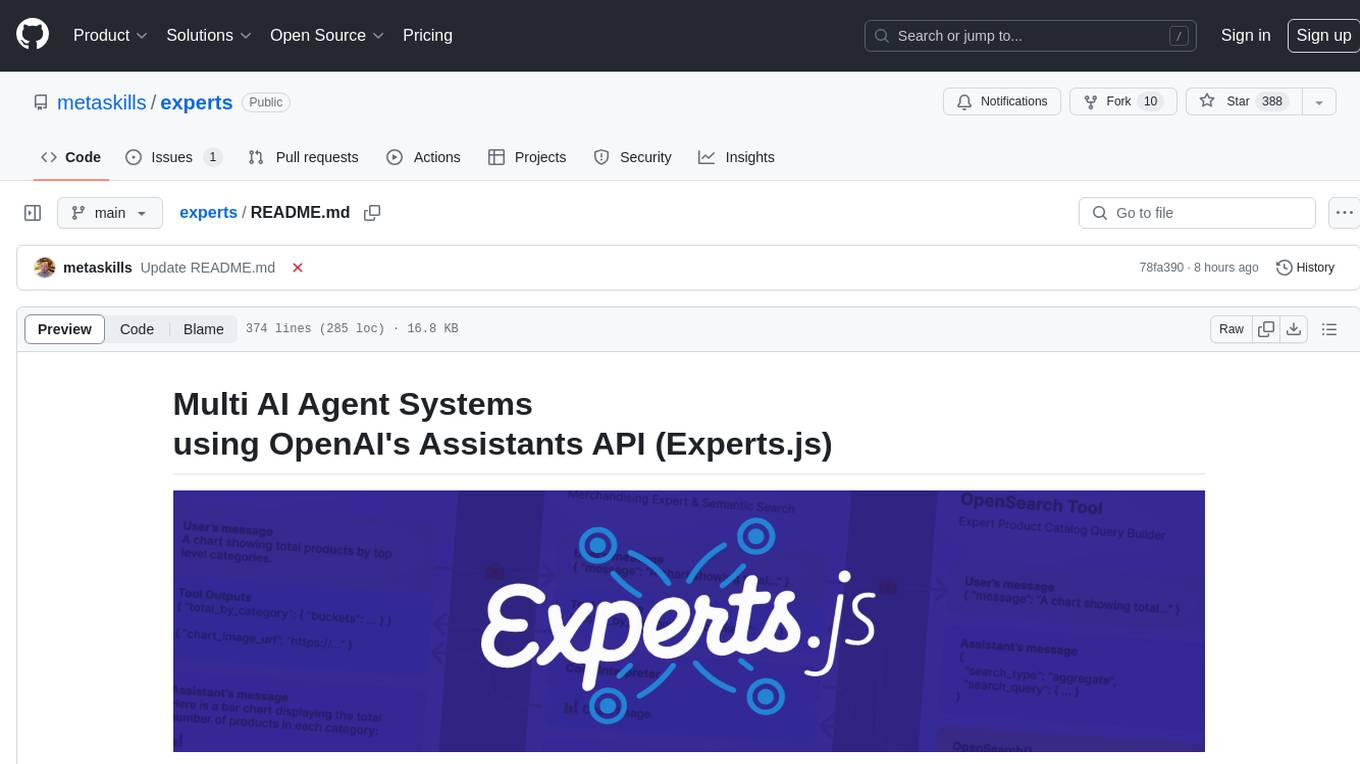
experts
Experts.js is a tool that simplifies the creation and deployment of OpenAI's Assistants, allowing users to link them together as Tools to create a Panel of Experts system with expanded memory and attention to detail. It leverages the new Assistants API from OpenAI, which offers advanced features such as referencing attached files & images as knowledge sources, supporting instructions up to 256,000 characters, integrating with 128 tools, and utilizing the Vector Store API for efficient file search. Experts.js introduces Assistants as Tools, enabling the creation of Multi AI Agent Systems where each Tool is an LLM-backed Assistant that can take on specialized roles or fulfill complex tasks.
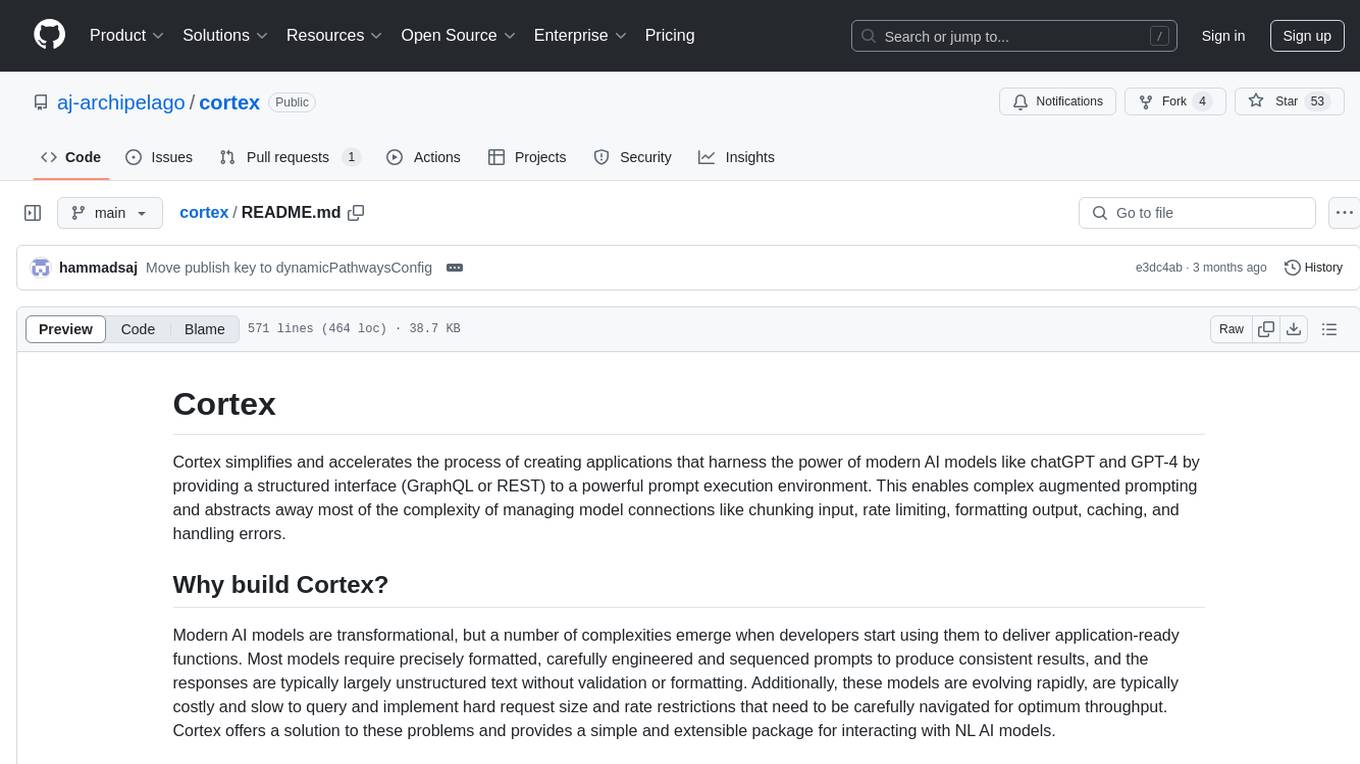
cortex
Cortex is a tool that simplifies and accelerates the process of creating applications utilizing modern AI models like chatGPT and GPT-4. It provides a structured interface (GraphQL or REST) to a prompt execution environment, enabling complex augmented prompting and abstracting away model connection complexities like input chunking, rate limiting, output formatting, caching, and error handling. Cortex offers a solution to challenges faced when using AI models, providing a simple package for interacting with NL AI models.
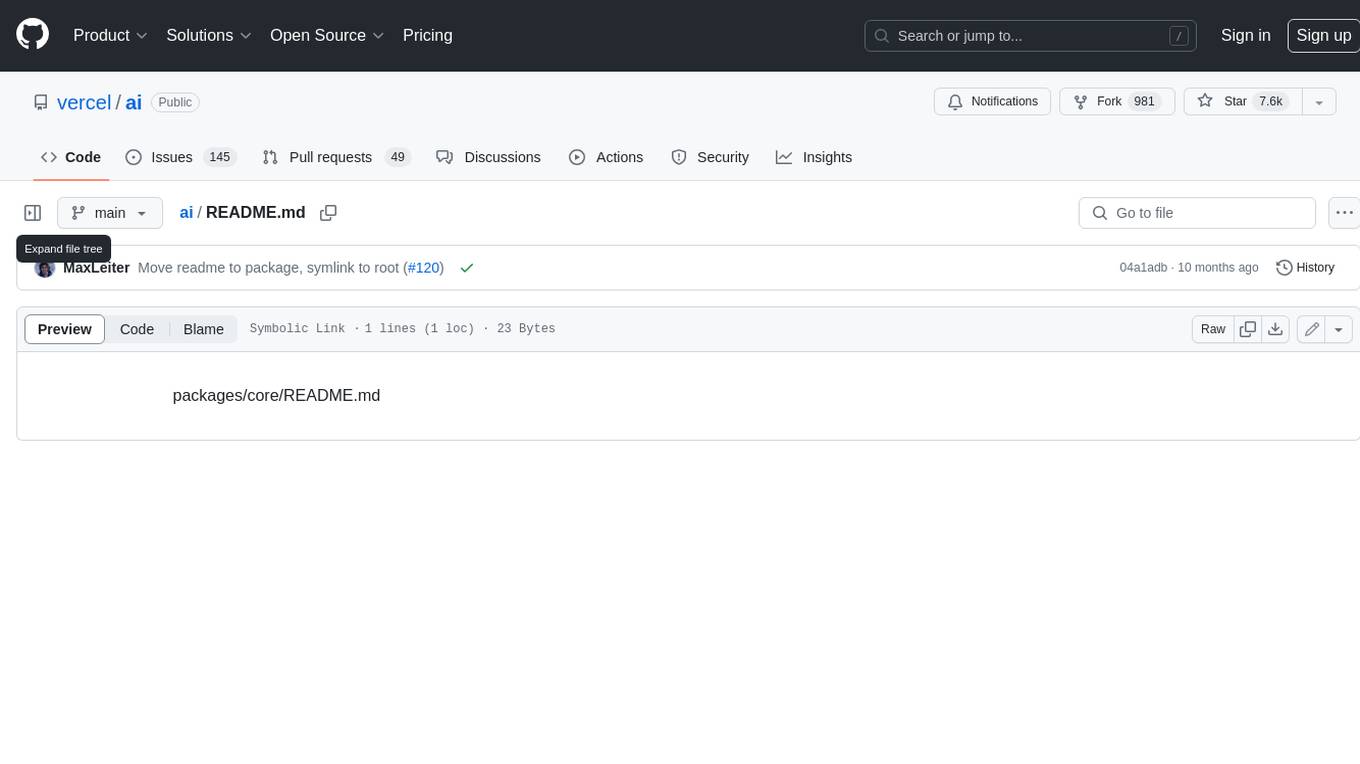
ai
The Vercel AI SDK is a library for building AI-powered streaming text and chat UIs. It provides React, Svelte, Vue, and Solid helpers for streaming text responses and building chat and completion UIs. The SDK also includes a React Server Components API for streaming Generative UI and first-class support for various AI providers such as OpenAI, Anthropic, Mistral, Perplexity, AWS Bedrock, Azure, Google Gemini, Hugging Face, Fireworks, Cohere, LangChain, Replicate, Ollama, and more. Additionally, it offers Node.js, Serverless, and Edge Runtime support, as well as lifecycle callbacks for saving completed streaming responses to a database in the same request.
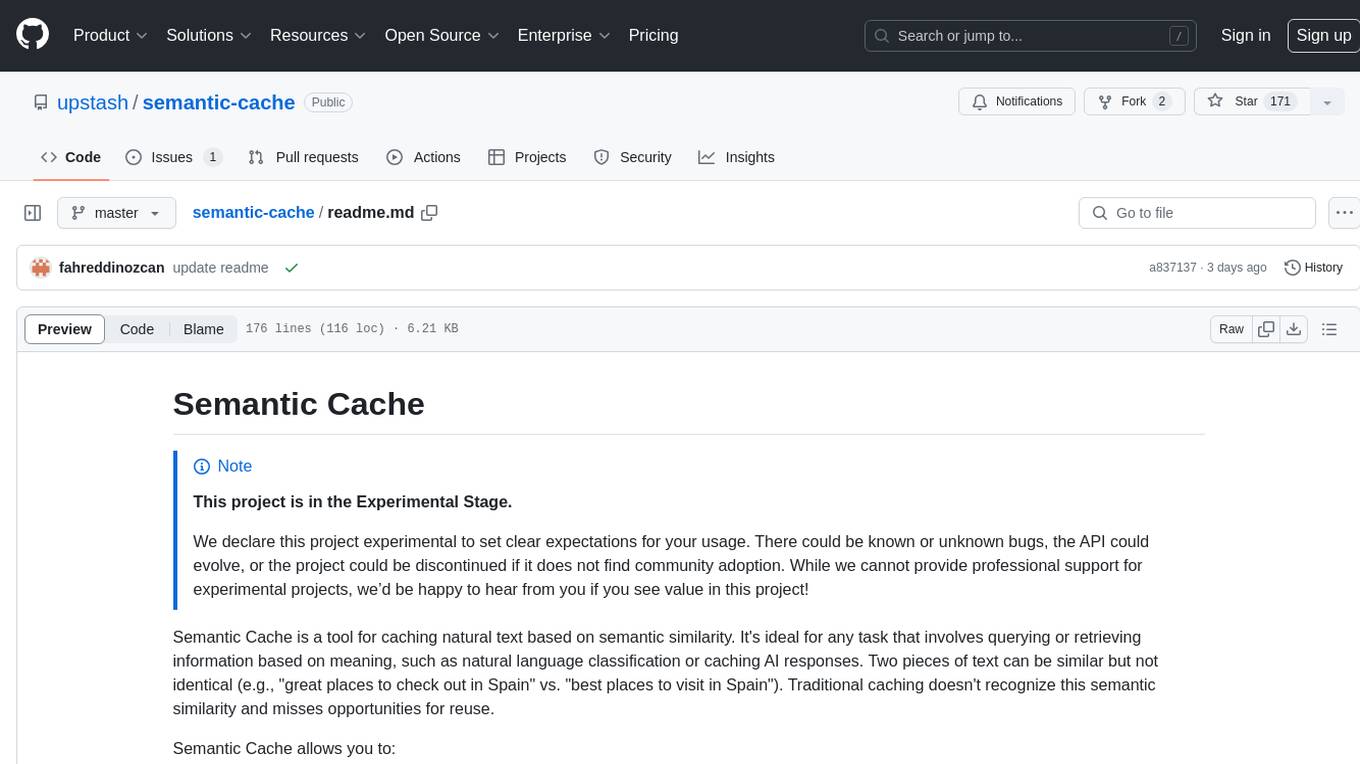
semantic-cache
Semantic Cache is a tool for caching natural text based on semantic similarity. It allows for classifying text into categories, caching AI responses, and reducing API latency by responding to similar queries with cached values. The tool stores cache entries by meaning, handles synonyms, supports multiple languages, understands complex queries, and offers easy integration with Node.js applications. Users can set a custom proximity threshold for filtering results. The tool is ideal for tasks involving querying or retrieving information based on meaning, such as natural language classification or caching AI responses.
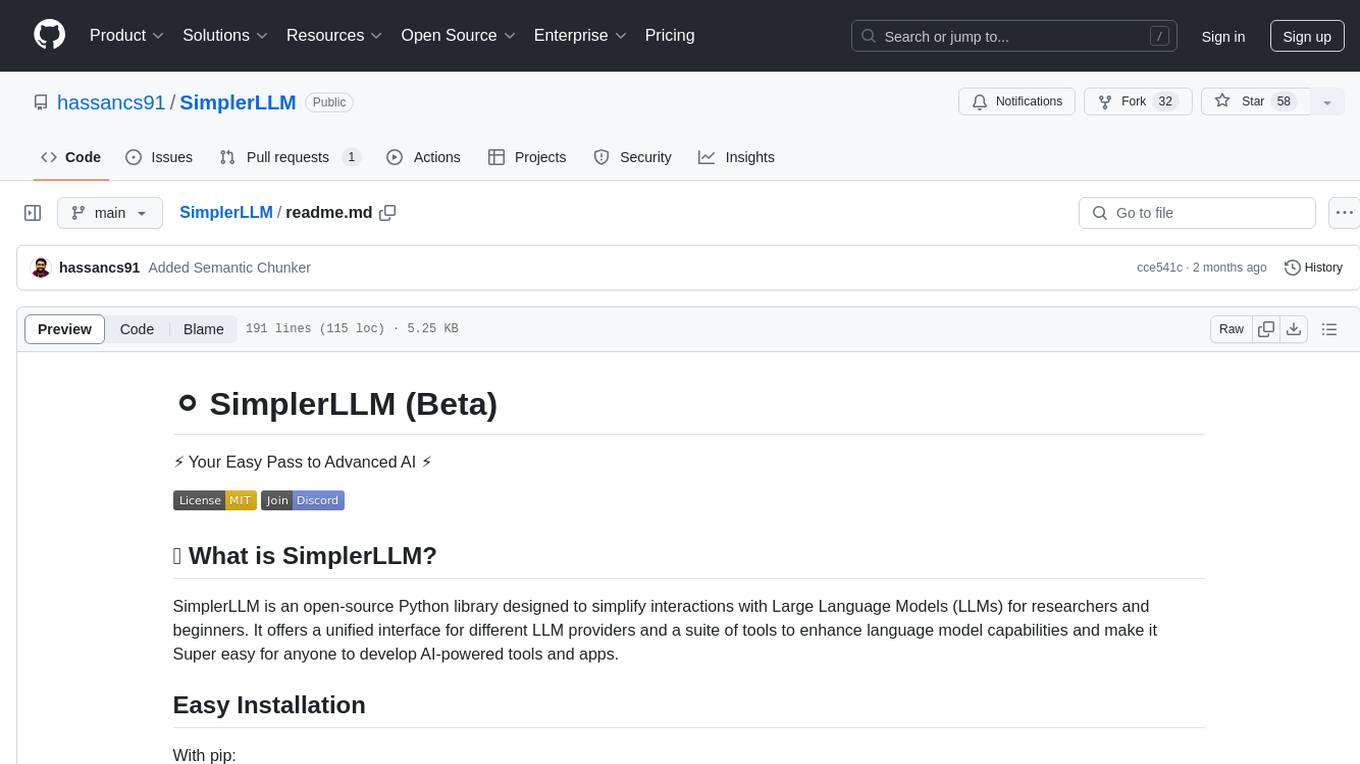
SimplerLLM
SimplerLLM is an open-source Python library that simplifies interactions with Large Language Models (LLMs) for researchers and beginners. It provides a unified interface for different LLM providers, tools for enhancing language model capabilities, and easy development of AI-powered tools and apps. The library offers features like unified LLM interface, generic text loader, RapidAPI connector, SERP integration, prompt template builder, and more. Users can easily set up environment variables, create LLM instances, use tools like SERP, generic text loader, calling RapidAPI APIs, and prompt template builder. Additionally, the library includes chunking functions to split texts into manageable chunks based on different criteria. Future updates will bring more tools, interactions with local LLMs, prompt optimization, response evaluation, GPT Trainer, document chunker, advanced document loader, integration with more providers, Simple RAG with SimplerVectors, integration with vector databases, agent builder, and LLM server.
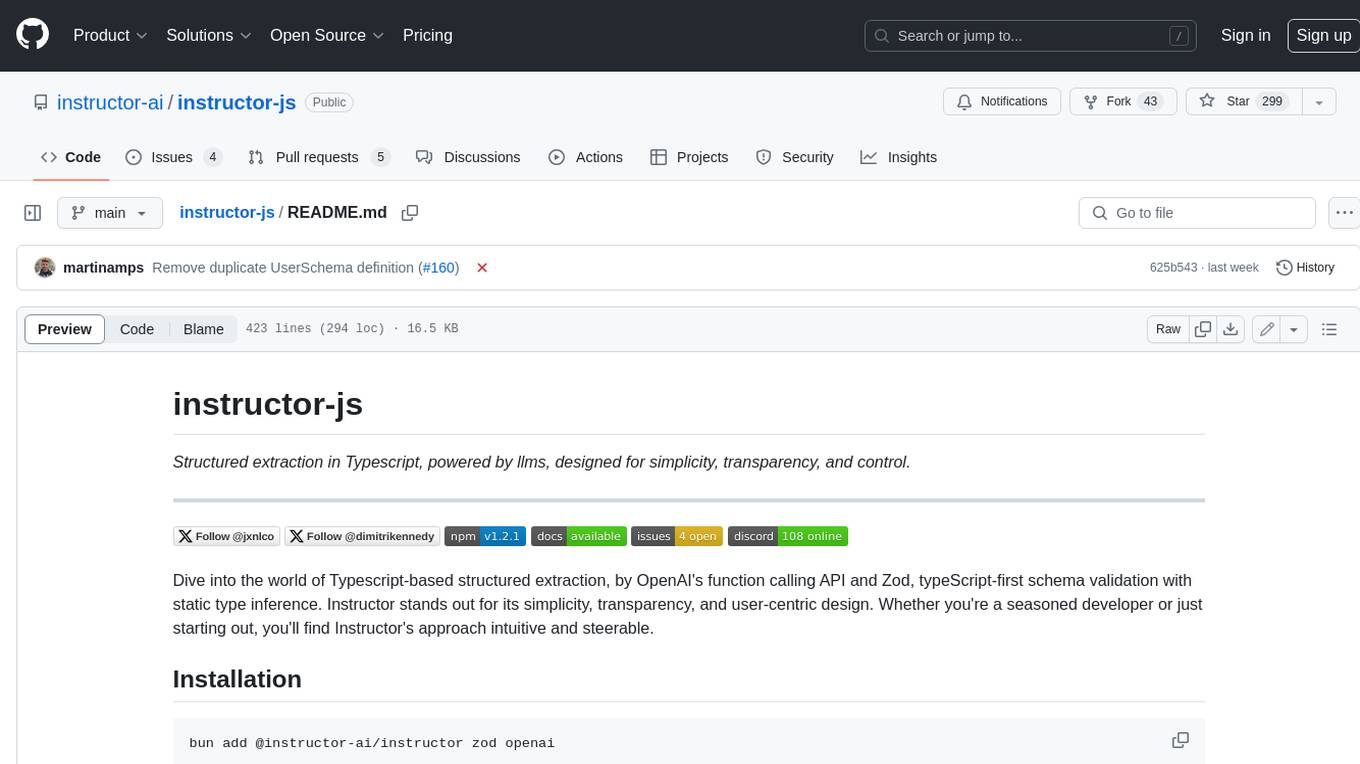
instructor-js
Instructor is a Typescript library for structured extraction in Typescript, powered by llms, designed for simplicity, transparency, and control. It stands out for its simplicity, transparency, and user-centric design. Whether you're a seasoned developer or just starting out, you'll find Instructor's approach intuitive and steerable.
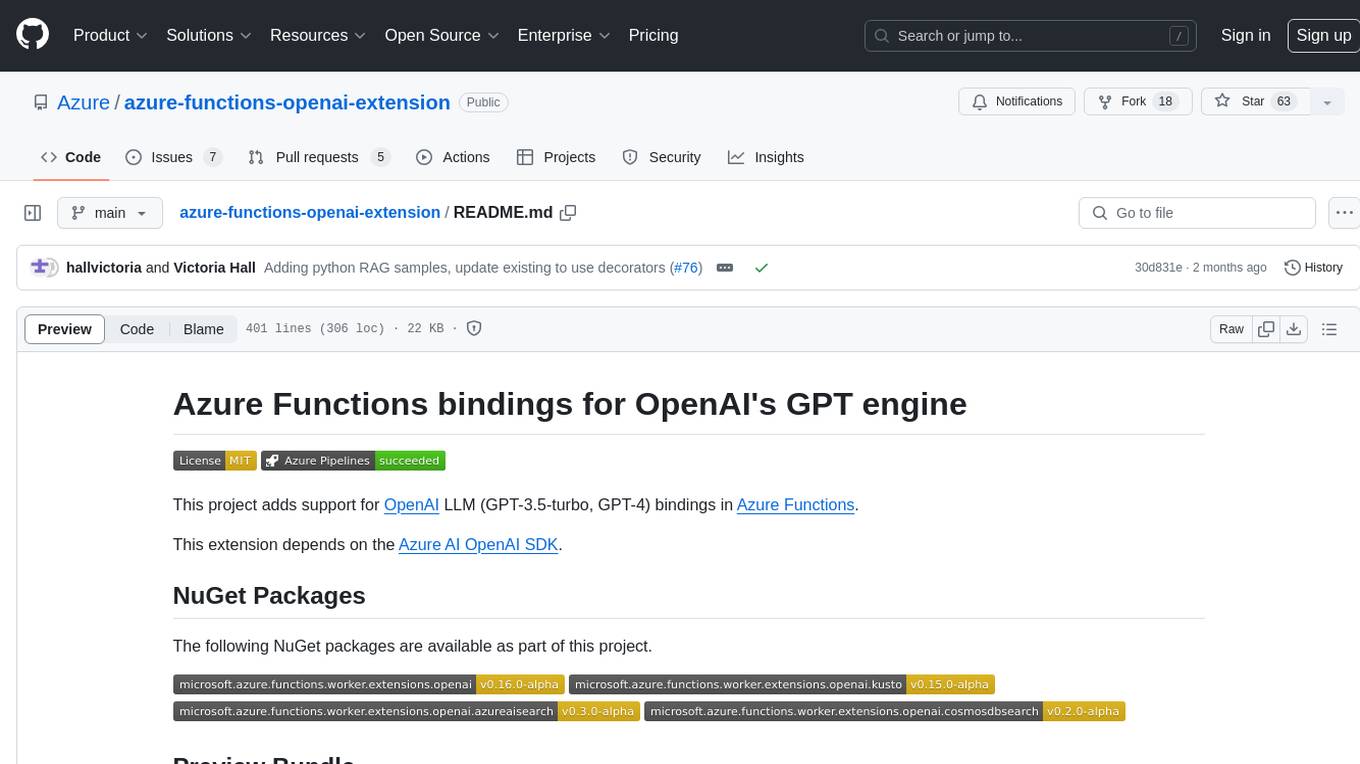
azure-functions-openai-extension
Azure Functions OpenAI Extension is a project that adds support for OpenAI LLM (GPT-3.5-turbo, GPT-4) bindings in Azure Functions. It provides NuGet packages for various functionalities like text completions, chat completions, assistants, embeddings generators, and semantic search. The project requires .NET 6 SDK or greater, Azure Functions Core Tools v4.x, and specific settings in Azure Function or local settings for development. It offers features like text completions, chat completion, assistants with custom skills, embeddings generators for text relatedness, and semantic search using vector databases. The project also includes examples in C# and Python for different functionalities.
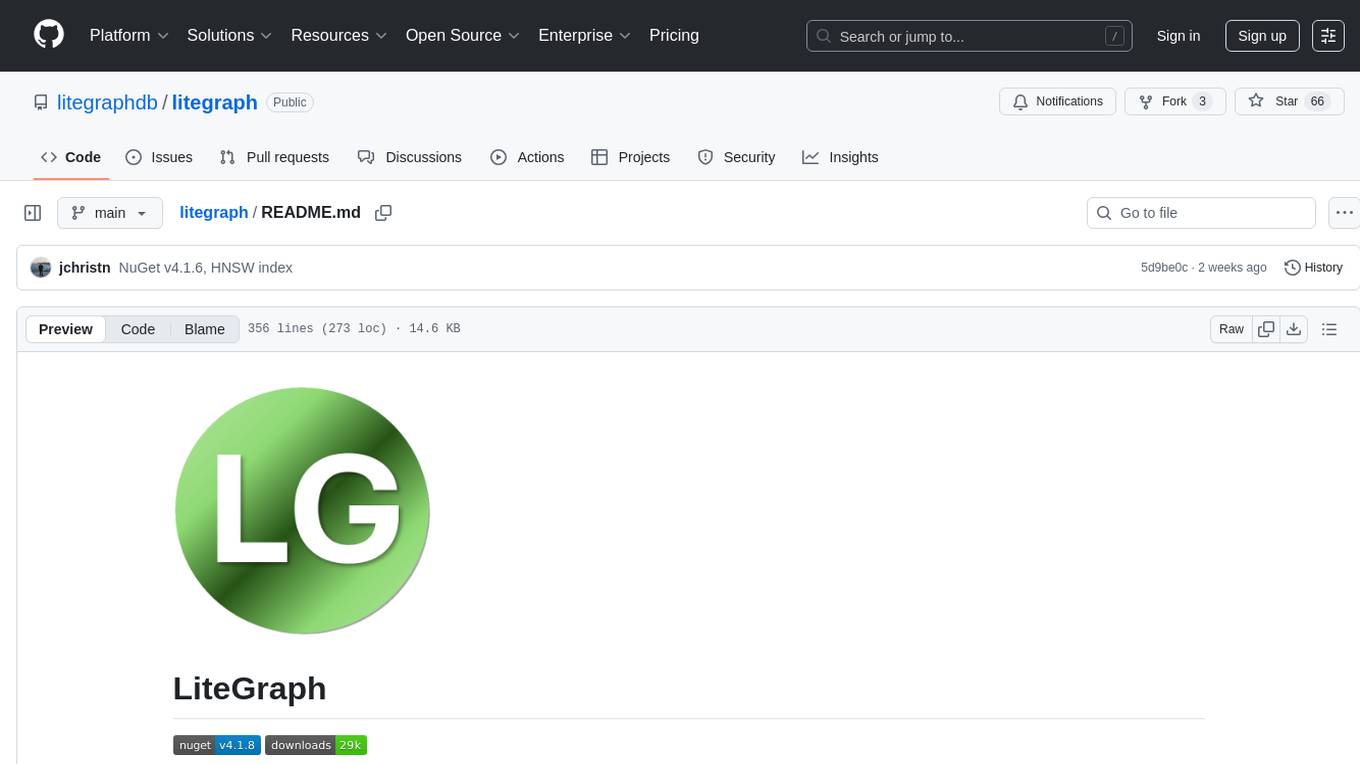
litegraph
LiteGraph is a property graph database designed for knowledge and artificial intelligence applications. It supports graph relationships, tags, labels, metadata, data, and vectors. LiteGraph can be used in-process with LiteGraphClient or as a standalone RESTful server with LiteGraph.Server. The latest version includes major internal refactor, batch APIs, enumeration APIs, statistics APIs, database caching, vector search enhancements, and bug fixes. LiteGraph allows for simple embedding into applications without user configuration. Users can create tenants, graphs, nodes, edges, and perform operations like finding routes and exporting to GEXF file. It also provides features for working with object labels, tags, data, and vectors, enabling filtering and searching based on various criteria. LiteGraph offers REST API deployment with LiteGraph.Server and Docker support with a Docker image available on Docker Hub.
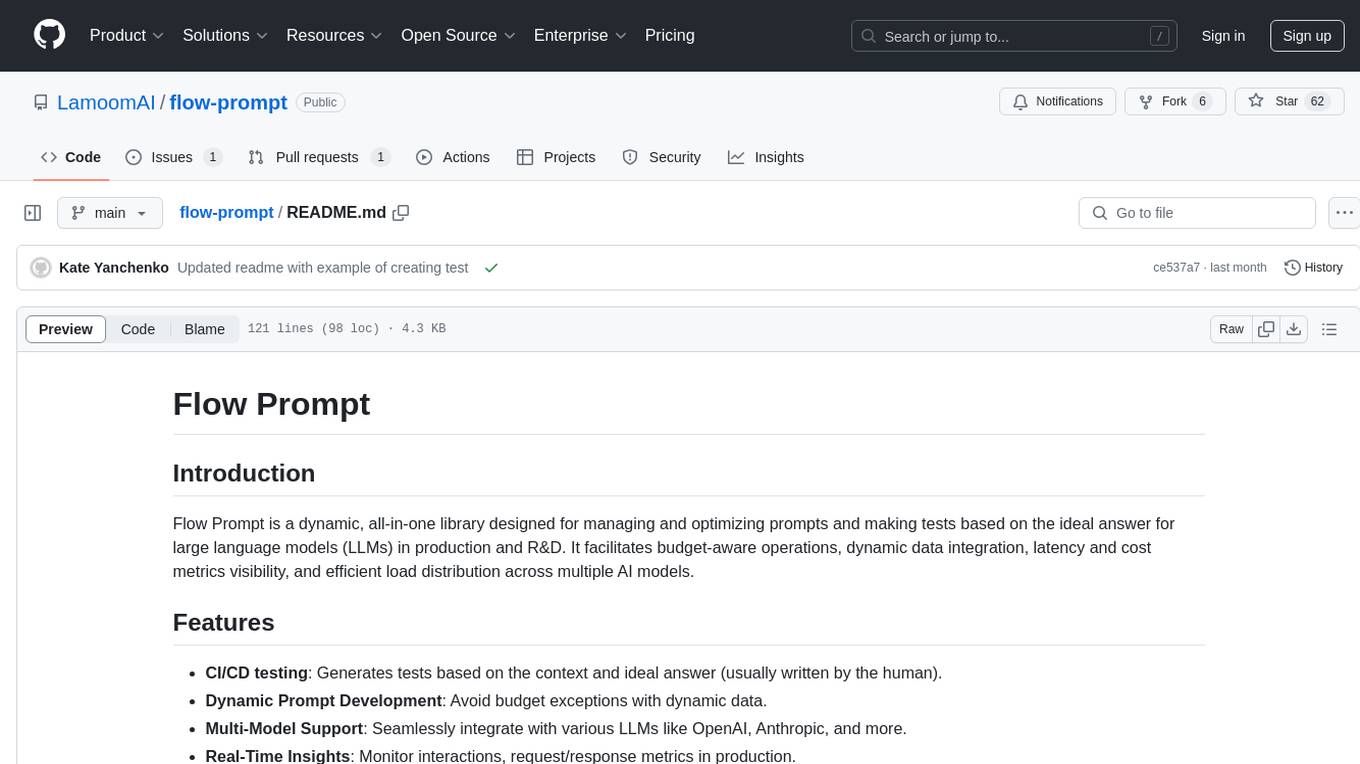
flow-prompt
Flow Prompt is a dynamic library for managing and optimizing prompts for large language models. It facilitates budget-aware operations, dynamic data integration, and efficient load distribution. Features include CI/CD testing, dynamic prompt development, multi-model support, real-time insights, and prompt testing and evolution.
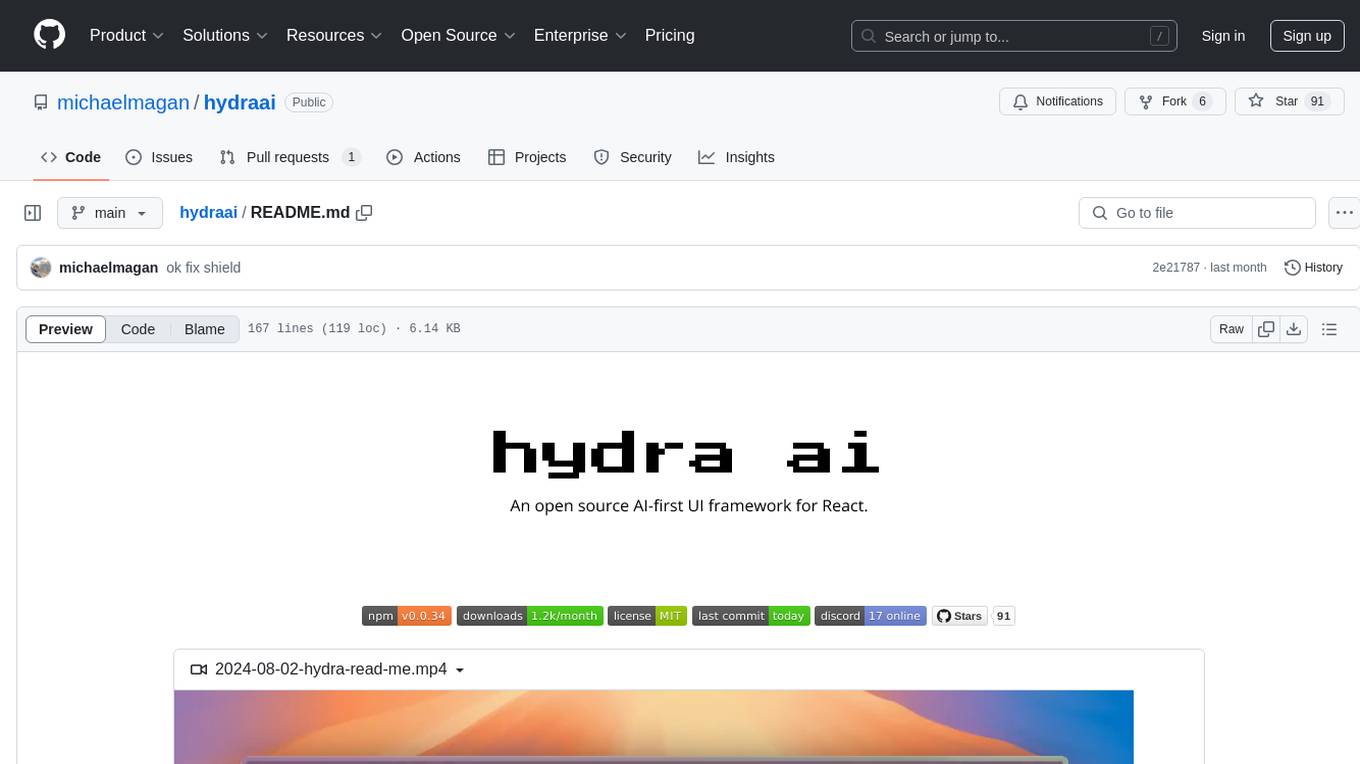
hydraai
Generate React components on-the-fly at runtime using AI. Register your components, and let Hydra choose when to show them in your App. Hydra development is still early, and patterns for different types of components and apps are still being developed. Join the discord to chat with the developers. Expects to be used in a NextJS project. Components that have function props do not work.
For similar tasks

agent-toolkit
The Stripe Agent Toolkit enables popular agent frameworks to integrate with Stripe APIs through function calling. It includes support for Python and TypeScript, built on top of Stripe Python and Node SDKs. The toolkit provides tools for LangChain, CrewAI, and Vercel's AI SDK, allowing users to configure actions like creating payment links, invoices, refunds, and more. Users can pass the toolkit as a list of tools to agents for integration with Stripe. Context values can be provided for making requests, such as specifying connected accounts for API calls. The toolkit also supports metered billing for Vercel's AI SDK, enabling billing events submission based on customer ID and input/output meters.
For similar jobs

sweep
Sweep is an AI junior developer that turns bugs and feature requests into code changes. It automatically handles developer experience improvements like adding type hints and improving test coverage.

teams-ai
The Teams AI Library is a software development kit (SDK) that helps developers create bots that can interact with Teams and Microsoft 365 applications. It is built on top of the Bot Framework SDK and simplifies the process of developing bots that interact with Teams' artificial intelligence capabilities. The SDK is available for JavaScript/TypeScript, .NET, and Python.

ai-guide
This guide is dedicated to Large Language Models (LLMs) that you can run on your home computer. It assumes your PC is a lower-end, non-gaming setup.

classifai
Supercharge WordPress Content Workflows and Engagement with Artificial Intelligence. Tap into leading cloud-based services like OpenAI, Microsoft Azure AI, Google Gemini and IBM Watson to augment your WordPress-powered websites. Publish content faster while improving SEO performance and increasing audience engagement. ClassifAI integrates Artificial Intelligence and Machine Learning technologies to lighten your workload and eliminate tedious tasks, giving you more time to create original content that matters.

chatbot-ui
Chatbot UI is an open-source AI chat app that allows users to create and deploy their own AI chatbots. It is easy to use and can be customized to fit any need. Chatbot UI is perfect for businesses, developers, and anyone who wants to create a chatbot.

BricksLLM
BricksLLM is a cloud native AI gateway written in Go. Currently, it provides native support for OpenAI, Anthropic, Azure OpenAI and vLLM. BricksLLM aims to provide enterprise level infrastructure that can power any LLM production use cases. Here are some use cases for BricksLLM: * Set LLM usage limits for users on different pricing tiers * Track LLM usage on a per user and per organization basis * Block or redact requests containing PIIs * Improve LLM reliability with failovers, retries and caching * Distribute API keys with rate limits and cost limits for internal development/production use cases * Distribute API keys with rate limits and cost limits for students

uAgents
uAgents is a Python library developed by Fetch.ai that allows for the creation of autonomous AI agents. These agents can perform various tasks on a schedule or take action on various events. uAgents are easy to create and manage, and they are connected to a fast-growing network of other uAgents. They are also secure, with cryptographically secured messages and wallets.

griptape
Griptape is a modular Python framework for building AI-powered applications that securely connect to your enterprise data and APIs. It offers developers the ability to maintain control and flexibility at every step. Griptape's core components include Structures (Agents, Pipelines, and Workflows), Tasks, Tools, Memory (Conversation Memory, Task Memory, and Meta Memory), Drivers (Prompt and Embedding Drivers, Vector Store Drivers, Image Generation Drivers, Image Query Drivers, SQL Drivers, Web Scraper Drivers, and Conversation Memory Drivers), Engines (Query Engines, Extraction Engines, Summary Engines, Image Generation Engines, and Image Query Engines), and additional components (Rulesets, Loaders, Artifacts, Chunkers, and Tokenizers). Griptape enables developers to create AI-powered applications with ease and efficiency.